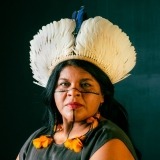This is
Sônia Guajajara receives the Freedom from Want Award
Sônia Guajajara is Brazil’s first Minister for Indigenous Peoples, after a lifetime of indigenous activism. In her new position, Guajajara continues her fight for the recognition and protection of indigenous lands. Due to deforestation, expropriation or eviction of indigenous peoples, the habitat of indigenous peoples is shrinking, including in the Amazon. Climate change also threatens indigenous peoples’ habitats: forests are crucial for CO2 storage. This is why Guajajara is also taking up the fight against climate change. In this way, environmental policy goes hand in hand with the fight for indigenous peoples’ rights.
Meer over Sônia Guajajara
Sônia Guajajara belongs to the Tenetehara-Guajajara, an indigenous population living in Maranhāo in northeastern Brazil. In 2018 she became the first indigenous woman to run for vice president on the presidential ticket of the Partido Socialismo e Liberdade (Party of Socialism and Freedom). However, this election was won by Jair Bolsonaro. Guajajara led the resistance against Bolsonaro's government over the next four years, which sought to accelerate expropriation and deforestation. In 2022, under the new President Lula da Silva, she was appointed as Brazil's first Minister of Indigenous Peoples.
Brazil's indigenous peoples have faced various oppressors for over 500 years. Throughout the centuries, they have been subjected to slavery, deadly diseases brought by European colonists, massacres, persecution, and forced conversion. Spread across Brazil, indigenous peoples are living in varying degrees of isolation. Illegal agriculture, deforestation, poaching and mining pose threats to these peoples. Sônia Guajajara advocates the freedom and protection of these communities. Several indigenous Brazilians, including members of the Guajajara people, have been murdered in order to facilitate illegal land grabbing. Satellite imagery reveals how indigenous territories often represent the last vestiges of remaining greenery amidst a landscape of deforestation.

